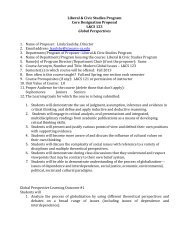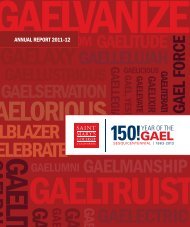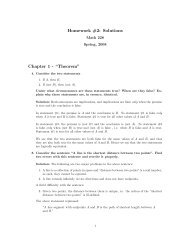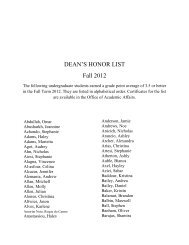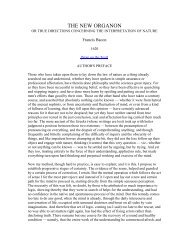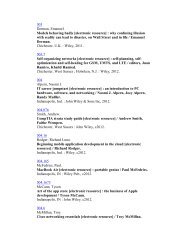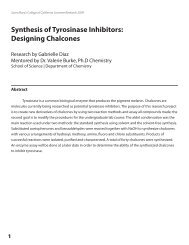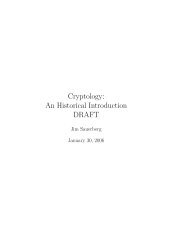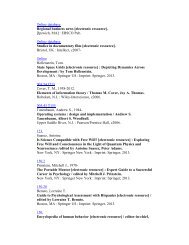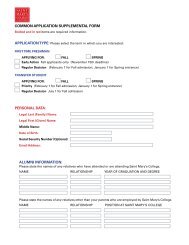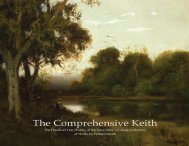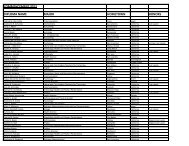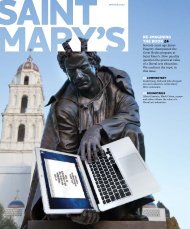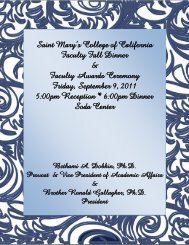English Curriculum264 CRAFT SEMINAR IN CREATIVE NONFICTIONThis course focuses on issues that influence the writing <strong>of</strong> nonfiction.Some seminars may focus on issues <strong>of</strong> craft <strong>of</strong> aesthetics — narrativestructure, point <strong>of</strong> view, or dialogue — and others may be thematic innature or explore a subgenre <strong>of</strong> nonfiction — personal essay, memoir,nature writing, travel writing, humor, book review, historical narrative,biography, etc. Readings may include a wide range <strong>of</strong> nonfiction fromdiverse backgrounds and historical periods as well as the students’ ownworks-in-progress.280 INTERNSHIPStudents have the opportunity to pursue internships either for electivecredit or as an extracurricular activity. The teaching internship is designedto permit the student to observe the conduct <strong>of</strong> a college course andto share the pedagogical activity <strong>of</strong> a supervising instructor. Studentsalso have the opportunity to receive credit for internships in publishing,arts administration, or teaching writing in the community. Thoughstudents may pursue an internship in publishing or arts administration atany time in their studies, the Program encourages students to do so intheir second year. Furthermore, teaching internships are only available tosecond-year students.290 THESISDuring the spring semester <strong>of</strong> the second year, each MFA candidate isrequired to pursue a tutorial course <strong>of</strong> study under the direction <strong>of</strong> anassigned faculty writer in the student’s genre. Through this tutorial, thestudent performs the revision necessary to turn two years <strong>of</strong> writing intoa coherent, polished book-length thesis: a collection <strong>of</strong> essays, poems, orshort stories; a novel, a memoir, or other book-length work <strong>of</strong> nonfiction.Students meet with their thesis director several times during thesemester to confer on the following aspects <strong>of</strong> the thesis: final revisionand editing <strong>of</strong> individual pieces to be included in the manuscript, selectionand arrangement <strong>of</strong> material, and coherence <strong>of</strong> the work as a whole.The student takes an oral examination with the thesis director and secondreader in order to assess the student’s knowledge <strong>of</strong> contemporaryliterary aesthetics and how they relate to his/her work. Upon satisfactorycompletion <strong>of</strong> the thesis and the oral exam, the thesis director andsecond reader approve the thesis.Students are admitted to the program primarily on the strength <strong>of</strong> amanuscript <strong>of</strong> original work submitted with the application, which willbe judged according to its literary merit and its indication <strong>of</strong> the author’sreadiness to study writing and literature on a graduate level.For more information, contact the MFA Program in Creative Writing,P.O. Box 4686, <strong>Saint</strong> Mary’s <strong>College</strong>, Moraga, CA 94575-4686, or phone(925) 631-4457 or (925) 631-4762.99
Curriculum Environmental Science and Studies ProgramsEnvironmental Science and Studies ProgramsThe Environmental Science and Studies programs instill in students knowledge from many disciplines. This knowledge isapplied to the study and management <strong>of</strong> the environment. Students examine the structure, function, and dynamics <strong>of</strong>ecosystems, the interaction between physical and living systems, and how human enterprise is adversely affecting environmentalquality. They explore how environmental degradation and pollution can be lessened or prevented by the application<strong>of</strong> sound management principles derived from ecological theory. In the study <strong>of</strong> the environment, students obtain thesatisfaction <strong>of</strong> working toward an understanding <strong>of</strong> the natural systems around them, the opportunity to acquire theskills necessary to participate in the solution <strong>of</strong> serious environmental problems and the insights essential to a successfulsearch for rational alternatives to present forms <strong>of</strong> ecosystem mismanagement. The programs foster critical thinkingand holistic ways <strong>of</strong> knowing, and <strong>of</strong>fer a variety <strong>of</strong> specific approaches — from the experimental protocols <strong>of</strong> the naturalsciences to ones that are similar to those <strong>of</strong> the social sciences and humanities. It seeks to achieve a balance between theempirical and normative aspects <strong>of</strong> environmental study. The bachelor <strong>of</strong> arts program involves less scientific rigor thanthe bachelor <strong>of</strong> science and places more emphasis on the social sciences, humanities and the arts.The location <strong>of</strong> <strong>Saint</strong> Mary’s <strong>College</strong>, near urban and suburban centers as well as a diversity <strong>of</strong> natural areas includingtidal, freshwater, estuarine, and marine systems; a delta, mountains, lakes, deserts, forests, valleys and scrub lands, allowsaccess to an impressive array <strong>of</strong> study sites ranging from the relatively undisturbed to the severely impacted. Internshipsare available to <strong>of</strong>fer first-hand experience in a variety <strong>of</strong> fields.FacultyWilliam E. Perkins, Ph. D., Director <strong>of</strong> Environmental Scienceand Studies ProgramRoy Allen, Ph.D., Pr<strong>of</strong>essor <strong>of</strong> Economics (Natural Resource Economicsand Human Ecology)Steven Bach<strong>of</strong>er, Ph.D., Pr<strong>of</strong>essor <strong>of</strong> Chemistry (Environmental Chemistry)Carla C. Bossard, Ph.D., Pr<strong>of</strong>essor <strong>of</strong> Biology(Plant Science, Ecology, Terrestrial Systems)Michael Black, Ph.D., Pr<strong>of</strong>essor <strong>of</strong> Political ScienceGlenna Breslin, Ph.D., Pr<strong>of</strong>essor <strong>of</strong> English (Nature Writing)Joel D. Burley, Ph.D., Associate Pr<strong>of</strong>essor <strong>of</strong> Chemistry(Atmospheric Chemistry, Environmental Chemistry)Gerard M. Capriulo, Ph.D., Fletcher Jones Pr<strong>of</strong>essor <strong>of</strong> Biology(Marine Science, Ecology, Invertebrates)Lawrence R. Cory, Ph.D., Pr<strong>of</strong>essor <strong>of</strong> Biology(Evolution, Environmental Perturbations)John Ely, Ph.D., Associate Pr<strong>of</strong>essor <strong>of</strong> Sociology and Anthropology(Society and the Environment)Brian Jersky, Pr<strong>of</strong>essor <strong>of</strong> Mathematics (Biostatistics)Philip Leitner, Ph.D., Pr<strong>of</strong>essor <strong>of</strong> Biology (Desert Ecology,Animal Physiological Adaptations)Gretchen Lemke-Santangelo, Ph.D., Pr<strong>of</strong>essor <strong>of</strong> History(U.S. Environmental History)Douglas Long, Ph.D., Adjunct in Biology (Animal Behavior)Lidia R. Luquet, Ph.D., Associate Pr<strong>of</strong>essor <strong>of</strong> Mathematics(Environmental Systems and Biological Modeling)Asbjorn Moseidjord, Ph.D., Associate Pr<strong>of</strong>essor <strong>of</strong> Economics(Environmental Economics)Micah Muscolino, Ph.D., Assistant Pr<strong>of</strong>essor <strong>of</strong> History(Environmental History <strong>of</strong> China and War)Ronald P. Olowin, Ph.D., Pr<strong>of</strong>essor <strong>of</strong> Physics and Astronomy(Geosciences, Environmental Modeling, Astronomy)Roy Wensley, Ph.D., Pr<strong>of</strong>essor <strong>of</strong> Physics and Astronomy(Computational and Ecosystem Modeling)Learning OutcomesWhen students complete the Environmental Science and Studies programs,they will be able to:• Recall and synthesize the knowledge derived from biology,chemistry, physics, earth science, economics, and political scienceto better understand the earth’s environment.• Comprehend environmental problems from multiple perspectives.• Evaluate the credibility <strong>of</strong> varying sources <strong>of</strong> informationon environment.• Display cognizance <strong>of</strong> ethical considerations and be mindful <strong>of</strong>them when constructing solutions to environmental problems.• Recognize the interconnectedness <strong>of</strong> earth’s ecosystems andhuman dependence on them.• Communicate skillfully, in organizing and presenting a seminar,in writing a scientific report <strong>of</strong> research findings, and in designing avisual presentation regarding environmental findings.• Know how to find information from library sources, originalscientific literature, and from the Internet on environmental topics.• Demonstrate competence in using the basic types <strong>of</strong> equipmentutilized in gathering information on the environment.• Recognize processes and patterns <strong>of</strong> environmental interactions.100



